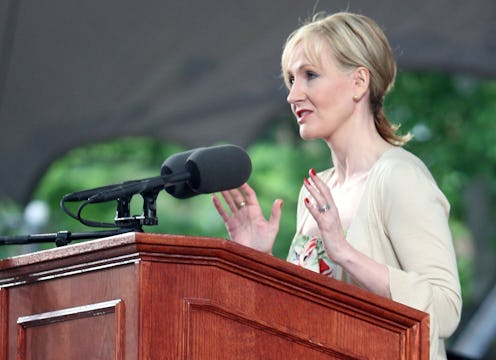J.K. Rowling is bringing light to the lives of a specific population of American youth, and not just through the Harry Potter books. Thursday in New York City, Rowling announced the opening of a U.S. arm of Lumos, her nonprofit that works to get children out of orphanages and group homes and back with their families.
Speaking at a press conference in New York City before symbolically lighting up the Empire State Building in conjunction with the launch, Rowling said, "At Lumos we seek to shine a light on those children who have been shut away from the world, sometimes forgotten. Eight million voiceless children are living globally in conditions that ensure they cannot reach their full potential." In bringing Lumos to the U.S., she told the Associated Press, she hopes to channel American attention and charitable giving to the children Lumos serves. The name "Lumos" refers to a magic spell Harry Potter uses to turn on the light at the end of his wand.
Lumos, which Rowling co-founded in 2005 under the name Children’s High Level Group, currently serves children and their families in central and eastern Europe and is expanding its work to Latin American and the Caribbean. Ninety percent of institutionalized children worldwide are not orphans, according to Lumos. They come from disadvantaged communities where parents with limited resources think their children will be better cared for by others.
Unfortunately, that often isn't the case.
In a statement on her personal website, Rowling described the visits to orphanages that led her to start Lumos:
If you have ever had a totally unfamiliar toddler cling to you in the evident hope that you might simply take them away with you, you will probably understand what it felt like to detach her fingers and leave. As I pretended to listen to the white-coated carer walking beside me, I remembered the horrifying statistics on the numbers of children who are trafficked from such institutions. That three-year old would have clung to absolutely anybody for a smile and a hug.
Institutionalization also has lifelong effects on children. Children who have lived in residential facilities are 10 times more likely to be involved in prostitution as adults, 40 times more likely to have a criminal record, and are 500 times more likely to commit suicide.
Lumos' goal is to end the institutionalization of kids worldwide by 2050.
Of course, even as Rowling announces a new phase of this incredibly important project, the media and fans couldn't resist taking the opportunity to ask her when (if?) they'll get their next Harry Potter fix. In an interview aired Friday morning on the Today show, Rowling told Matt Lauer, "I'm afraid I haven't been writing the next Harry Potter," but then added, "I've always said I'm not going to say I definitely won't because, because I don't see why I should say that. You know, it's my world and I might choose to step back into it."
So she gave fans sooooome hope, but more importantly, she's offering hope to institutionalized kids and their families. Thanks, J.K. Rowling, for helping turn the lights on for them.
